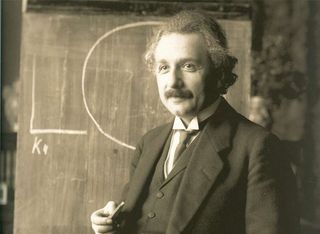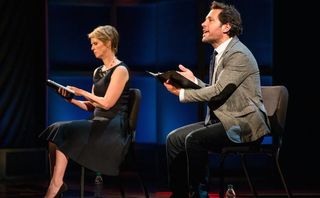Einstein in Love: Letters Illuminate Genius' Dark Side

NEW YORK — Albert Einstein's genius did not extend to his own love life, which was full of messy affairs, bumpy marriages and bitter endings, as judged by his letters to the women in his life.
A reading of the letters written by Einstein to his wives and other women brought the strange, complicated life of the world's most famous scientist to the stage in Alan Alda's play "Dear Albert," at New York University's Skirball Center for Performing Arts, here at the World Science Festival on May 28.
"The interesting thing to me is that [Einstein] was searching all through his life for simplicity, and he couldn't have had a more chaotic personal life," Alda said.
The young Einstein, played by Paul Rudd, wrote frequently to his fellow student Mileva Marić, played by Cynthia Nixon, a brilliant and determined woman who later became his wife. Their relationship began with heated passion despite an unwelcome pre-marriage pregnancy and Einstein's parents' disapproval of the relationship. [Einstein Quiz: Test Your Knowledge of the Famous Genius]
The couple, who spent a lot of time apart, wrote of their love for each other in between lines of enthusiastic scientific discussions interrupted by mathematical equations.

Marić and Einstein lived together for some 10 years, during which Einstein's career flourished and he published his revolutionary theory of relativity. But the relationship began to flounder, and the flirtatious Einstein turned to his cousin Elsa in1912, to whom he complained about Marić's depression and jealousy.
When Marić resisted divorce, the pragmatic scientist wrote a list of terms and conditions for continuing to live with her: "You will make sure, that my clothes and laundry are kept in good order; that I will receive my three meals regularly in my room; that my bedroom and study are kept neat, and especially that my desk is left for my use only," Einstein wrote. He also asked Marić to renounce any personal relations with him, not to expect any intimacy, and to stop talking to him if he requested it.
Sign up for the Live Science daily newsletter now
Get the world’s most fascinating discoveries delivered straight to your inbox.
Marić and Einstein got divorced on Feb. 14, 1919, after having lived apart for five years. Einstein married Elsa on June 2, 1919, but letters from Elsa's daughter suggest he had difficulty deciding whether to marry the mother or the daughter.
Einstein went on to have yet other affairs during his second marriage, but he did stay loyal to one thing and that was physics. However, his letters show he was as capricious toward his theoriesas he was with women. Many times he absolutely believed he had the true solution, just to disprove it later.
Einstein's quest for finding a unified theory that could explain all space and time was reflected in his personal correspondence, and continued until his death.
He was a man who once said he had sold himself, body and soul, to science. But the scientific giant was still in many ways like the rest of humanity. He had a human side too, with all the well-known human frailties and shortcomings.
"Such a genius should be irreproachable in every respect," Elsa once wrote about her husband in a letter. "But nature does not behave this way, where she gives extravagantly, she takes away extravagantly."
Email Bahar Gholipour. Follow us @LiveScience, Facebook & Google+. Original article on Live Science.

